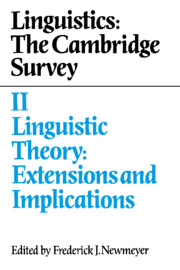Book contents
- Frontmatter
- Contents
- Contributors
- Preface
- 1 Extensions and implications of linguistic theory: an overview
- 2 Grammar and language processing
- 3 Grammatical principles of first language acquisition: theory and evidence
- 4 Second language acquisition and grammatical theory
- 5 Brain structures and linguistic capacity
- 6 Abnormal language acquisition and the modularity of language
- 7 Grammatical aspects of speech errors
- 8 Grammar and conversational principles
- 9 Discourse analysis: a part of the study of linguistic competence
- 10 Speech act distinctions in grammar
- 11 Computer applications of linguistic theory
- 12 Metrics and phonological theory
- 13 Grammatical theory and signed languages
- 14 The linguistic status of creole languages: two perspectives
- 14.I Creole languages and the bioprogram
- 14.II Are creoles a special type of language?
- 14.III A dialog concerning the linguistic status of creole languages
- Subject index
- Name index
- Contents of volumes I, III, and IV
7 - Grammatical aspects of speech errors
Published online by Cambridge University Press: 08 February 2010
- Frontmatter
- Contents
- Contributors
- Preface
- 1 Extensions and implications of linguistic theory: an overview
- 2 Grammar and language processing
- 3 Grammatical principles of first language acquisition: theory and evidence
- 4 Second language acquisition and grammatical theory
- 5 Brain structures and linguistic capacity
- 6 Abnormal language acquisition and the modularity of language
- 7 Grammatical aspects of speech errors
- 8 Grammar and conversational principles
- 9 Discourse analysis: a part of the study of linguistic competence
- 10 Speech act distinctions in grammar
- 11 Computer applications of linguistic theory
- 12 Metrics and phonological theory
- 13 Grammatical theory and signed languages
- 14 The linguistic status of creole languages: two perspectives
- 14.I Creole languages and the bioprogram
- 14.II Are creoles a special type of language?
- 14.III A dialog concerning the linguistic status of creole languages
- Subject index
- Name index
- Contents of volumes I, III, and IV
Summary
‘A final word about the theory of errors. Here it is that the causes are complex and multiple…’
Henri Poincaré 1854–1912 (Reprinted in Newman 1956)‘Give me fruitful error any time, full of seeds, bursting with its own corrections.’
Vilfredo Pareto 1848–1923 (Quoted in Mackay 1981)Historical background
Linguists have been collecting and analyzing slips of the tongue at least as far back as the eighth century CE when the Arab linguist Al-Ki-sa'i wrote his book Errors of the populace (Anwar 1979). As Anwar (1979, 1981) points out, more than a hundred books on speech errors written by Arab grammarians have been published since that seminal work, many during the important medieval period of Arabic linguistic studies.
Although a number of these medieval studies have prescriptivist intent, using the term ‘error’ primarily in reference to wrong usage by non-native speakers of Arabic or speakers of nonstandard dialects, the grammarians also recorded, analyzed and classified a wide variety of slips of the tongue, i.e. ‘unintentional linguistic innovation(s)’ (Sturtevant 1947) or ‘involuntary deviation(s) in performance from the speaker's current phonological, grammatical or lexical intention(s)’ (Boomer & Laver 1968), as is being done by linguists today. Like Paul (1886, 1919), Sturtevant (1917), Jespersen (1922) and Meringer (1908), many of the medieval Arab studies were motivated by an interest in speech errors as a possible cause of historical change; others attempted to provide phonetic and phonological explanations in terms of assimilatory factors and/or the interface between phonological and morphological processes. Anticipations, deletions, and insertions of linguistic units were noted in studies conducted over eleven centuries ago.
- Type
- Chapter
- Information
- Linguistics: The Cambridge Survey , pp. 117 - 138Publisher: Cambridge University PressPrint publication year: 1988
- 6
- Cited by



